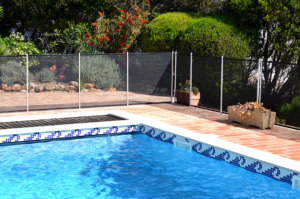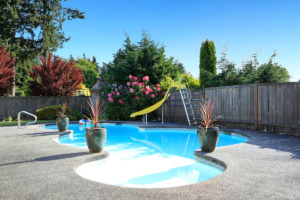If you’ve ever spent a typical August day in Southwest Florida, you have no trouble understanding why so many homes in the region come fortified with swimming pools. Owning a pool affords you the opportunity to live your best Florida life in defiance of the state’s famously hot and oppressive summers. Moreover, if the recent pandemic taught us nothing else, we learned how calming and restorative a pool can be. Especially when you are suddenly forced to spend extended periods of time at home.
According to recent data from the Association of Pool & Spa Professionals, there are over 10.7 million swimming pools in the United States, or one pool for every 33 people! Needless-to-say, that number isn’t spread evenly across all 50 states. Instead, the warm weather states have more pools, the cooler ones less.
Florida’s 1,590,000 pools—by far the largest number of any state—equate to one pool for every 14 residents. Only Arizona, where the average summer temperature hovers between 100 and 105 degrees, boasts slightly more pools per person (13) than Florida. Conversely, cold weather states like Wyoming offer fewer pools per person. (One for every 194 residents)
Even if your immediate housing goals don’t necessarily include owning a pool, when you buy a home in Florida’s red hot real estate market there’s a strong possibility you will get one anyway. In 2019, for example, 40% of the homes sold in Sarasota County were equipped with swimming pools.
Before you take ownership of a pool—whether by design or default—it is important to do your due diligence on the structure, just as you would the rest of the house. Don’t allow yourself to be so dazzled at the thought of owning a pool that you neglect to ask the tough questions about its care, maintenance and associated costs.
Here are several key questions you should ask when a swimming pool is part of your proposed property purchase:
Is the pool safe?

With relaxation comes responsibility. When I was five, my parents bought a home with a pool. Such an extravagance was definitely not on their radar. But it was a hyperactive real estate market—not unlike today’s—in which there were very limited choices. Buyers who needed a new home right away were forced to settle on whichever available property came closest to meeting their overall needs. Ours happened to include a large in-ground pool that was long overdue for a major overhaul.
Of course, we kids were overjoyed at the prospect of having a pool in our own back yard, not to mention how easy it made making new friends in our new neighborhood. But the awesome responsibility of owning a pool was never lost on my parents, and I distinctly recall how my mother always kept one eye on whatever she was doing and the other trained on the swimming pool. Despite it being properly fenced, we were expressly forbidden to go near the pool unless at least one responsible adult was present to watch. (Hell rained down on anyone who broke that simple commandment.)
Today, thanks to all the new wireless technologies, pool safety is a much easier proposition. According to the Florida Swimming Pool Association—which is headquartered in Sarasota—you can install several layers of highly effective protection without breaking the bank.
The bottom line? If you aren’t completely committed to pool safety on your property, you should probably rethink buying the house.
What is the condition of the basic pool structure and its surrounding walkways?
Just as you will have the home inspected prior to purchase, be sure to give the pool a thorough onceover as well. Due to the complex nature of a pool’s structure, its plumbing and filtration systems, industry professionals strongly advise hiring a specially trained pool inspector rather than simply relying on a pool store manager for an assessment.
If possible, have a face-to-face talk with the seller or prepare a list of questions for your Realtor to submit. Among the things you will want to know is the age and current condition of the pool shell. Depending on which building material was used, pools can last anywhere from 5 to 25 years before they require serious resurfacing or replacement.
What is the pool’s most recent and long-term maintenance history? Does the filtration system function properly? Are there any detectable leaks? Are the drains and electrical connections up to all current safety codes? Which accessories—such as skimmer baskets, filter, pump, lighting, heater and pool furniture—will be included in the property transfer.
If there is one, be sure to obtain the contact information for the pool’s cleaning and maintenance service (or person), as they can be a font of information as to how well the pool has been maintained and how much its maintenance will cost you going forward. It may also be helpful to document which repairs or upgrades are needed now, versus down the road, along with an estimated timeline and the cost for completing each project.
Indeed. if maintaining the pool is likely to strain your budget, it is better to find out now before you buy the home and become responsible for its upkeep.
How does owning a pool affect my homeowner’s insurance policy?
A swimming pool is officially termed an “attractive nuisance” by most insurance companies. That means a neighbor’s child may be attracted to your beautiful blue pool, trespass on your property to get a closer look, and be at heightened risk for injury or death should they enter and use it.
Typically, an attractive nuisance has three legal components:
- The law doesn’t expect children to fully comprehend the danger they may face by trespassing on your property.
- Sometimes the law places a special responsibility on the property owner to prevent harm that could easily occur under the right circumstances.
- If the property owner fails to meet this responsibility, he or she may be held liable for any injuries that result from their negligence.
You can expect to pay more for your homeowner’s insurance once a pool becomes part of your property mix.
Standard homeowner policies typically limit personal injury liability coverage to $100,000. But adding a swimming pool increases your exposure to liability. Thus, purchasing additional coverage is both a wise and recommended move.
According to Zacks Investment Research, insurance companies typically recommend increasing liability coverage from $100,000 to $500,000 for customers who add a swimming pool. In most cases, the added cost of this coverage is relatively modest and may already be factored into your coverage when you live in a warm weather state such as Florida, where private backyard pools are a common item.

Does everyone in my household know how to swim?
Swimming is an essential life skill that every child should learn as soon as it is practical for them to do so.
According to the American Association of Pediatrics, “drowning is the single leading cause of injury and death for children ages 1 to 4, and one of the top causes of death for teens. Children can benefit from swimming lessons as young as age one, but parents should gage their child’s maturity, health concerns, water exposure and readiness to determine at what age to start swimming lessons.”
Does everyone in my household know how to perform CPR?
CPR is another vital life skill. If you are planning to own a pool, it is a wise decision for everyone in the household to be fully versed in CPR. Indeed, the few minutes’ time between on-the-scene CPR and the arrival of EMS may literally make the difference between life and death.
Both the American Heart Association and the American Red Cross, two of the leading proponents of learning CPR, offer a complete schedule of training classes, with options available on weekdays, nights and weekends, plus online, instructor-led and blended learning course formats.


Comments